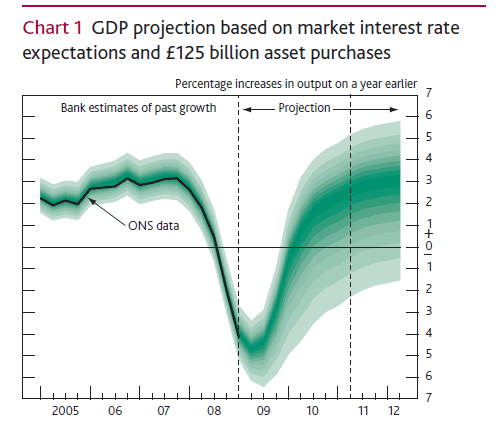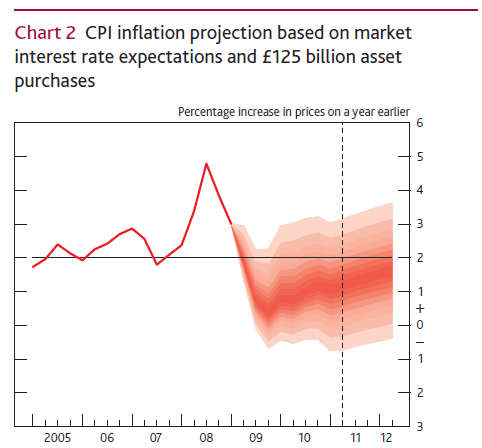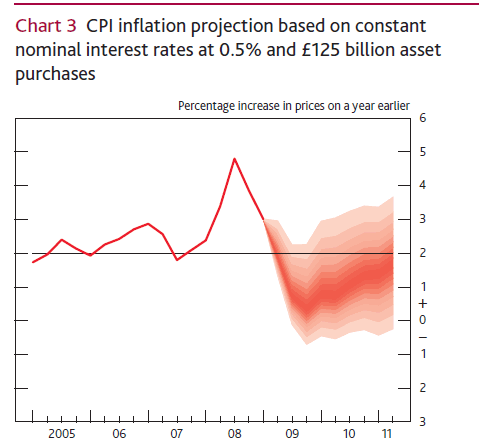Bank of England Inflation Report May 09, Governor Mervyn King Statement
Economics / UK Economy May 13, 2009 - 05:43 PM GMTBy: BoE
 Mervyn King writes: Over the past year the world economic and financial system has received emergency treatment. At home Bank Rate has fallen almost to zero, there has been a fiscal stimulus and hundreds of billions of pounds have been directed to supporting and resolving the banking system. Now the economy requires a period of healing. That will take time.
Mervyn King writes: Over the past year the world economic and financial system has received emergency treatment. At home Bank Rate has fallen almost to zero, there has been a fiscal stimulus and hundreds of billions of pounds have been directed to supporting and resolving the banking system. Now the economy requires a period of healing. That will take time.
Activity in the UK economy has fallen sharply. After last autumn’s financial panic, output contracted at its fastest pace since quarterly data became available in 1955. But the position is worse in many other countries. Every member of the G7 has experienced large falls in trade and output, and the OECD believes that all but four of its thirty member countries were in recession in the first quarter of 2009.
These falls in output reflect the collapse in confidence and tightening of credit conditions around the world to which I referred in February. Having expanded unsustainably for several years, the world’s largest banks are restructuring their balance sheets. In turn, households and companies are gradually adjusting their balance sheet positions as well. Domestic demand in the countries that ran large current account surpluses must rise relative to spending in those countries that ran deficits. In the UK, our national saving rate will need to rise.
All these adjustments are taking place in an uncoordinated fashion. That is why economic policy faces the tricky task of trying to ensure that the process of adjustment is neither too rapid in the short run nor impeded in the long run. Growth of broad money and spending has slowed to a standstill, with painful consequences. Spare capacity is building and unemployment is rising. And the necessary adjustment of balance sheets is far from complete. There is, therefore, great uncertainty about the outlook.
On the one hand, there are three solid reasons to believe that activity will rebound in the short term. First, an unprecedented policy stimulus, both monetary and fiscal, has now been injected into the UK economy. Second, a further boost to activity is being provided by the substantial depreciation in sterling. Third, the stock cycle, which in recent quarters has dragged down materially on output growth, should soon turn and work in the opposite direction. In time, these three factors are likely to drive a recovery in output growth.
On the other hand, there are also solid reasons for supposing that a sustained recovery will take considerably more time. This recession is different in nature from earlier downturns in the post-war period. The financial crisis lowered asset prices and revealed the extent of leverage on balance sheets. Correcting those imbalances will require significant and persistent changes in the flow of spending and, in the banking sector, actions to reduce leverage and raise capital. As a result, although the measures taken by governments to stabilise their banking systems have been truly extraordinary in scale and scope, it is likely that the supply of credit will continue to be restricted for some while, with banks being risk averse and aiming to raise capital ratios. Some of the past build up of debt in the private sector has in effect been taken into the public sector. The prospect of a necessary fiscal consolidation in many countries may dampen the pace of recovery of household and corporate spending in the short run, but it will also lower long-term interest rates.
Judging the balance of these influences on the UK economy is extraordinarily difficult. Some of the surveys afford promising signs that the pace of decline in activity has moderated. But they do not tell us how strong and persistent any such recovery will prove to be, precisely because of the uncertainty surrounding the way in which balance sheets will evolve. The Monetary Policy Committee has always stressed that a projection is a probability distribution for possible outcomes and not a single path for either growth or inflation. It is particularly important, therefore, that you help us to communicate this key aspect of our projections to a wider audience.
 Chart 1 (GREEN CHART) represents the Committee's best collective judgement of the range of outcomes for four-quarter GDP growth, assuming that Bank Rate follows a path implied by market interest rates and that the stock of purchased assets, financed by the issuance of central bank reserves, reaches £125 billion and remains at that level throughout the forecast period. The stimulus to demand, combined with a turnaround in the stock cycle, is likely to drive a recovery in activity. But in the light of the state of balance sheets, especially in the financial sector, the Committee judges that the risks are weighted towards a relatively slow and protracted recovery.
Chart 1 (GREEN CHART) represents the Committee's best collective judgement of the range of outcomes for four-quarter GDP growth, assuming that Bank Rate follows a path implied by market interest rates and that the stock of purchased assets, financed by the issuance of central bank reserves, reaches £125 billion and remains at that level throughout the forecast period. The stimulus to demand, combined with a turnaround in the stock cycle, is likely to drive a recovery in activity. But in the light of the state of balance sheets, especially in the financial sector, the Committee judges that the risks are weighted towards a relatively slow and protracted recovery.
 Chart 2 (FIRST RED CHART) shows the Committee's judgement about the implications of that outlook for the path of CPI inflation. Inflation is likely to fall back sharply over the next few months, as the impact of past increases in energy and food prices drops out of the twelve-month comparison. Thereafter, the margin of spare capacity that is likely to persist over the forecast period pushes down on CPI inflation. That is partially offset by the upward pressure associated with the pass-through of sterling’s depreciation to consumer prices. The relative magnitude of these opposing influences on inflation is again highly uncertain, but on balance the Committee judges that, conditional on Bank Rate following a path implied by market rates, inflation is more likely to be below the target than above it for most of the forecast period.
Chart 2 (FIRST RED CHART) shows the Committee's judgement about the implications of that outlook for the path of CPI inflation. Inflation is likely to fall back sharply over the next few months, as the impact of past increases in energy and food prices drops out of the twelve-month comparison. Thereafter, the margin of spare capacity that is likely to persist over the forecast period pushes down on CPI inflation. That is partially offset by the upward pressure associated with the pass-through of sterling’s depreciation to consumer prices. The relative magnitude of these opposing influences on inflation is again highly uncertain, but on balance the Committee judges that, conditional on Bank Rate following a path implied by market rates, inflation is more likely to be below the target than above it for most of the forecast period.
 Chart 3 (SECOND RED CHART) shows an alternative view of the prospects for inflation under the assumption that Bank Rate is constant over the next two years. As you can see, the risks to the inflation outlook relative to the target become more evenly balanced towards the two-year forecast horizon.
Chart 3 (SECOND RED CHART) shows an alternative view of the prospects for inflation under the assumption that Bank Rate is constant over the next two years. As you can see, the risks to the inflation outlook relative to the target become more evenly balanced towards the two-year forecast horizon.
With this in mind, at its policy meeting last week the MPC voted to maintain Bank Rate at 0.5%, and to increase the programme of asset purchases to £125 billion in total. Those policy actions are aimed at boosting the supply of money and credit, thus helping to restore a level of money spending in the economy consistent with meeting the inflation target while spare capacity is gradually re-absorbed. The economy will eventually heal, but the process may be slow.
By Mervyn King
Governor of the Bank of England
http://www.bankofengland.co.uk
© 2009 Copyright Bank of England - All Rights Reserved
Disclaimer: The above is a matter of opinion provided for general information purposes only and is not intended as investment advice. Information and analysis above are derived from sources and utilising methods believed to be reliable, but we cannot accept responsibility for any losses you may incur as a result of this analysis. Individuals should consult with their personal financial advisors.
© 2005-2022 http://www.MarketOracle.co.uk - The Market Oracle is a FREE Daily Financial Markets Analysis & Forecasting online publication.



